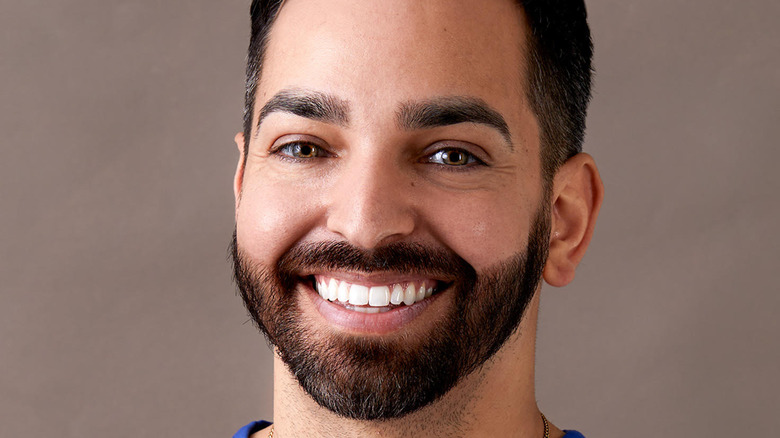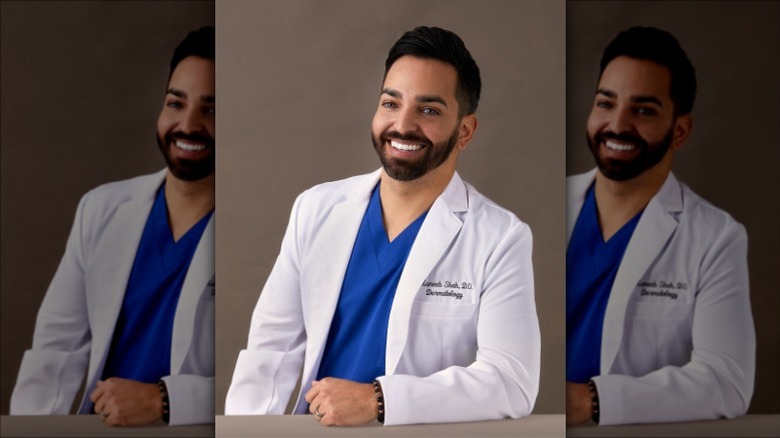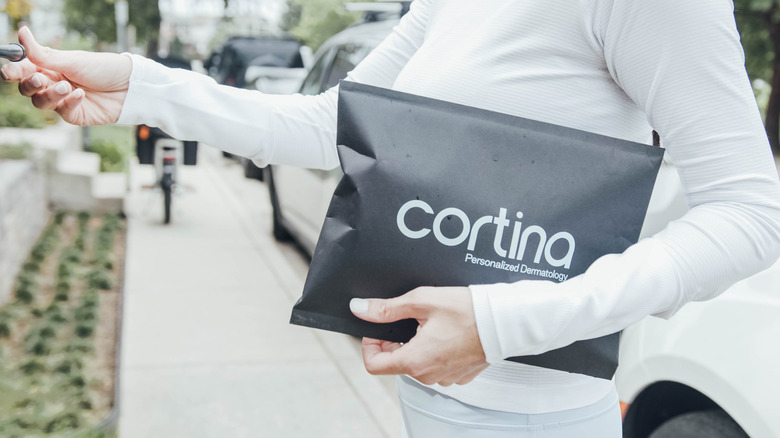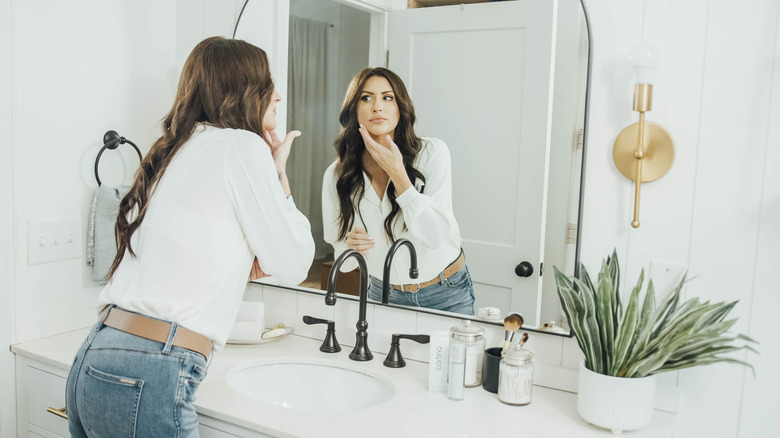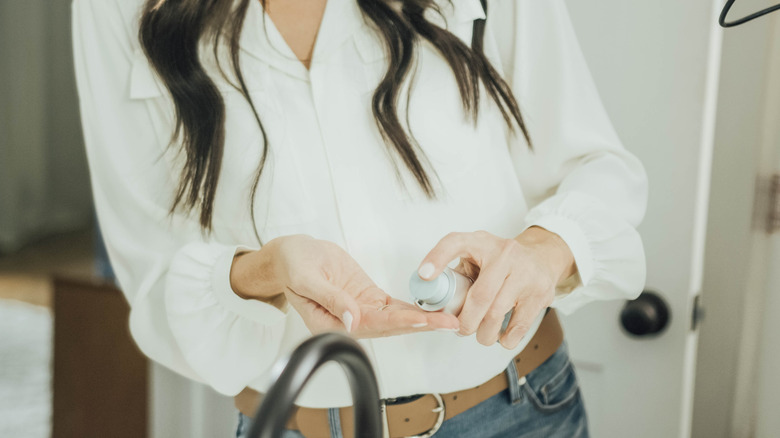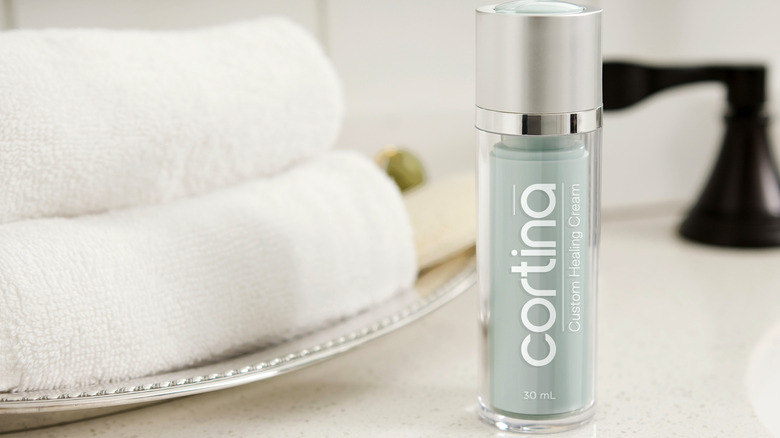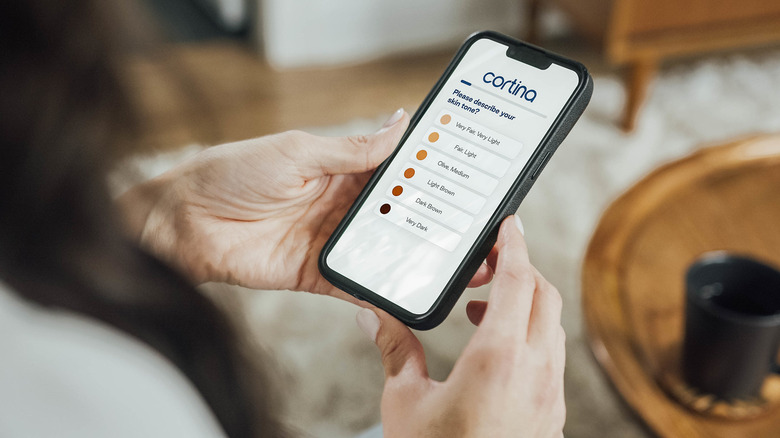TikTok's 'Derm Doc' Dr. Muneeb Shah On Providing Skincare Education And Access To The Masses - Exclusive Interview
With over 20 million followers, Muneeb Shah, DO — known as "Derm Doc" on TikTok — has developed the largest following of any dermatologist on the platform, but he doesn't consider himself an "influencer." Per his LinkedIn profile, he considers himself a "global educator." The board-certified dermatologist has a passion for helping others, and social media has given him the opportunity to do so on a massive scale; he first began creating informative content on TikTok during the onset of the coronavirus pandemic in 2020.
Since obtaining his medical degree from Nova Southern University in Ft. Lauderdale, Florida, he served as chief dermatology resident at Campbell University before becoming a partner with the North Carolina dermatology practice PC Dermatology PLLC and joining the dermatology telehealth platform Cortina as an advisor. A forward-thinking physician who's also the founder and CEO of DermCollective LLC, Dr. Shah is relatable to his Gen Z followers, who look to him for his expertise and advice. He conveys medical information in a simple way that everyone can understand — which likely contributed to his social media presence resonating so strongly with users.
Health Digest had the opportunity to sit down with the dermatologist and content creator about his passion for providing skincare education and bringing dermatologist-backed skincare products to everyone.
His path to dermatology and creating content on TikTok
Your first TikTok videos went viral, and you've reached over 20 million followers in only about three years. What do you attribute that to?
This whole thing was unintentional. I never expected to be a quote-unquote "social media influencer." I was seeing patients in clinic and then coming home, holding my phone up against the light, and creating content. I think it grew so quickly because everyone has skin. It's the first thing that you interface with the world, and it's the first thing people see when they see you. TikTok is a global platform, so I was getting videos going viral in Malaysia. I'd get analytics feedback that 3 million people in Malaysia saw my video. It's crazy.
At first, it almost felt like I was posting in a vacuum because I started posting during COVID. I'd get a million views, but to me, the concept of a million people watching a video felt almost surreal and hard to quantify. But there are people suffering with skin conditions [around] the world, and they want simple and straightforward answers to improving their skin.
Over three years, I've made thousands of videos that answer everyone's skincare questions. I try to make them as relatable as possible because even though I have the education in dermatology, and I'm board-certified in dermatology, and I've done 12 years of education, I'm no different than you. My struggles are the same as yours, so I try to communicate as clearly as possible so that anyone can understand it and implement those changes.
What motivated you to pursue dermatology, and later, to create TikTok videos?
As a med student, you choose a specialty and train in it, and you don't really know what you're getting into. I was fortunate to end up loving dermatology, but why I love it so much is that we make tangible differences to people's skin. It's one of the few [specialties] in medicine where you implement something and can see quick results. [Patients] come back three months later, and their acne is clear, for example, which is an amazing feeling for the patient. But it's also an amazing feeling as a provider of care. You feel like you accomplished something. As somebody who likes to get direct feedback, I fell in love with that process and with patient care in general, seeing people's [skin conditions improve], and how that affects their overall well-being and mental health.
Before I got on social media, I tutored and mentored medical students for many years, though it was more in-depth scientific content back then. I did a lot of board review for the USMLE, our medical licensing exam ... With TikTok, I saw the [opportunity] to educate the public about skin conditions through social media to make it simple for people to understand. As an educator, it came easy to me, so that's why I do it. I love it.
His new role with telehealth platform Cortina
Tell us more about your new role with the telehealth platform Cortina, how the platform works, and how that partnership came about.
It's an interesting story — I'll start with how this came about. Because of my work on social media, a lot of different companies reach out to me and want to collaborate on brand deals and sponsorships. Probably over the last two to three years, I've had maybe six, seven, eight different tele-dermatology platforms reach out to me to help get these highly effective [products and ingredients] in people's hands. But when I would listen to their proposals, they were commoditizing the healthcare piece. Dermatologists [were not] involved. The formulas they put together were not any better than what you could find over the counter.
Cortina was one of the last companies to reach out to me. At that point, I was almost fed up with hearing these pitches because my audience trusts me. What I say, I need to believe. It has to be what I would tell my mom to do if she asked me. Cortina's pitch was, "We believe that everyone should have access to board-certified dermatologists." They wanted to do a video with me, but I wanted to be involved in a real, meaningful way. Tele-dermatology is happening no matter what anyone wants to do to stop it ... My thought was, "How can you as a dermatologist be involved as part of that process to be the one getting the right products out there to people?"
There's a gap between what's available over the counter and what's only available with a prescription from a dermatologist, and some people can't see a dermatologist. Cortina solves that problem of getting these highly effective products to people who don't have access to a dermatologist. This is where those effective products come in to treat different skin conditions. They can also be shipped to your house, which is cool, so it solves that problem, too.
[Cortina offers] a great product and service. I have a way to communicate that to the public ... I would tell people, "You should be using tretinoin for your acne." And everyone's saying to me, "Well, I don't have access to tretinoin. I can't see a dermatologist, or I can't afford to see a dermatologist, or the wait time is six months." ... My only role as an advisor to the company is to get people to know about them so they can get better access to good dermatology care. It's that straightforward. It's telling people, "Hey, if you have skin conditions that can be treated with tele-dermatology, this is the platform you should use." It fits with all my ethos, and that's why I aligned with them.
That's great. I agree that to be authentic, you need to believe in what you're promoting and not just say it.
Absolutely. Beauty influencers get a lot of free products, and they may have a certain amount of wealth where they can buy a product and throw it away if they don't like it. Most people don't live like that. If they buy a product, they're counting on it to do something for them. If I tell you to use Cortina because I have some type of financial motive and it gets in your hands, it would break my heart if that was your last $30. To me, doing the right thing is so important.
Smart skincare tips to consider as you age
How important is your skincare routine as you age? How much of a role do factors such as genetics and stress play when it comes to our skin?
Genetics plays a huge role. There are the cards you're dealt and then what you do with those cards, essentially. We know that certain ethnicities, certain backgrounds, certain people have more melanin in their skin that gives them, naturally, more sun protection. Aging is based on your skin type and tone and everything; it's all related. Acne is highly genetically charged, so there's a genetic component to it. You can't change that. What do you do from there? The two [main factors] are genetics and sun exposure. The more sun exposure you get, the more negative effects you're going to have on the skin like wrinkles, texture, larger pores, [and] hyperpigmentation. Those are all caused by the sun.
The [most important thing as you age] is to protect what you were given. If you think about it, your skin was probably [in the best condition] when you were a baby. When people say "soft like a baby's skin," it's because sun exposure and time are what cause your skin to age. Sun protection is probably the number one thing you can do. Use SPF 30 broad-spectrum sunscreen every day, and you'll be better off than 99% of people.
Stress is also something that we know causes acne, at the very least. There's a certain hormone that's produced by the brain that essentially acts on your oil glands to secrete more oil and cause more acne. More stress is directly correlated with acne — we know that. But stress in general on your system will cause aging. You get high levels of cortisol production in the body from the adrenal glands, and that adrenal effect on the body causes collagen breakdown, wrinkles, and more inflammation. We know that stress plays a massive role, but what can you do to curb that? It's to be less stressed, more mindful, to meditate. But it's hard to know whether those interventions are improving the skin or not.
When it comes to skincare products, many claim to help under-eye hollowing and dark circles. Is there anything that will do it other than fillers and Botox? What are your thoughts on some of those trends?
I always look at skincare. I'm very methodical. If we know what causes dark circles — for example, diet, like [for] the blue blood vessels underneath the eyes, caffeine is something that can tighten those blood vessels and make them less obvious. If it's due to pigment, actual melanin pigment depositing in the skin, then something like niacinamide or retinol could be beneficial there.
There are dark circle creams that are effective because they have ingredients specifically designed to solve real problems underneath the eyes. Then there are a lot of under-eye creams that claim to help dark circles, but they're just moisturizers. That's why you need to be an educated consumer. There is no eye cream that's a miracle, though. I'll tell you that.
Under-eye fillers are more likely to be successful as well as some of the procedures we do in the office. But for eye creams, look for more modest improvements, though there are eye creams specifically designed to be helpful for under-eye issues.
His perspective on holistic skincare support
For me personally, making changes to my diet to help reduce inflammation made a huge difference to my skin. I stopped breaking out. What are your thoughts on these types of holistic support?
[We tend to] look at systems as isolated, but they're also interconnected. For that reason, it's difficult to definitively say the effect on the body of what you eat, [your lifestyle], your stress levels, the alcohol you consume, [whether] you smoke. All things affect your entire body as a whole, and you can't separate them. Anything that has a negative effect on your heart is going to have a negative effect on your skin.
Anti-inflammatory diets, for example, will benefit the skin. We know that the diet, especially in Western cultures, affects our skin because acne is more of a Western phenomenon than a lot of other skin conditions. You don't see as much acne in other parts of the world, so it could be the stress levels. It could also be the diet we have in the West that's causing a lot of the acne. But we can't pinpoint what specific aspect of the diet is causing these things ... The reason why you don't see a lot of doctors honing in on this aspect is because it's not as concrete.
It's different when you have a skincare product, and you apply that skincare product — and only that skincare product — for three months. We can measure the difference after three months, but diet is confusing because there are so many other factors that come into play. For example, is it the coffee you're drinking that's causing the problem? It's difficult to know the exact cause. But what you're consuming every day has to have an effect on the skin.
We know that high-glycemic diets — diets that are high in sugar — affect the skin. They're pro-inflammatory. They cause acne and age the skin by damaging collagen. Then you get into things that are less concrete. Does dairy play a role? Some studies say yes; some studies say no. If it is dairy, they say mostly skim milk, for some reason, causes more problems than other forms of dairy. Maybe protein plays a role. Vitamin B12 supplements seem to make acne worse. Chocolate's another one. All these things may play a role, and everyone is different.
What I always tell people is that we have good evidence that certain diets are anti-inflammatory for the heart. Even though the studies aren't there for the skin, anti-inflammatory diets like the Mediterranean diet would be beneficial for the skin because they decrease inflammation. We know a lot of the problems we see with our skin are due to inflammation, so if we could decrease the inflammation in the body, it probably will affect the skin in a positive way. I totally agree with these interventions.
You have to live an overall healthy lifestyle. It's not just skin deep; it's much bigger than that. If you notice an intervention improves your skin, who am I as a doctor to say, "No, there's no study that shows that helps"? If you're the person who notices an improvement, I'm going to say, "Well, maybe that, for you, is an inflammatory food, so cutting it out of your diet is going to improve your skin." I don't have enough ego to say that these lifestyle interventions don't work, so I do recommend them.
His thoughts on the rise of vegan and 'clean' beauty products
More information has come to light about harmful chemicals in some skincare and beauty products. We've also seen an emphasis on vegan and "clean" products. What's your take on this? Is this more than a fad, or is there documented research?
This is a super interesting question and very topical, actually. Let's talk about vegan quickly — I don't think that's a trend or a fad. That's a personal lifestyle decision where you don't want animal products in your skincare products because of your beliefs around what you eat and what you put in and on your body. I think the people [who] feel strongly about vegan will always feel strongly. That will always be something to consider if that's important to you.
"Clean," on the other hand, is an interesting thing. Why I say it's topical is that clean beauty right now is under attack in some ways. The pendulum went one way — everybody wants these products labeled "clean." There's been some pushback from the scientific community on this, and it has even recently resulted in lawsuits where some companies were labeling products based on their ingredients, whether they were considered clean or not. The problem with "clean" is that it's not a regulated term by the FDA or the FTC. It's not regulated by the Food, Drug, and Cosmetic Act, so anyone can say something is "clean" and decide what that means, but what's clean for you may not be clean for me.
"Clean" is not well-defined. It's purely a marketing term used to tell people, "This product is safe for you, and products that are not clean are not safe for you." But who decides? It's not the government. It's the companies themselves who are deciding what's clean and what's not. I like to base it on ingredients that have been shown to be harmful or irritate the skin or cause allergy. That would be my definition of clean, but that's not how the rest of the world looks at it. "Clean" is something that will probably fall out of favor until it's better defined.
What his followers most want to know
What questions do your followers ask most often?
The interesting thing is once you've been doing it for maybe six months or so, you rarely hear a question you haven't heard before. Everybody has the same questions, the same problems. "Is this product good? Is this product safe? Is it okay to use this on my skin? What do you recommend as far as SPF coverage and sunscreen? What are the best treatments for acne? What are the best treatments for dark spots?"
People have real problems and want real solutions for those problems. Straightforward [is] what people want. The skincare and beauty industry is designed to confuse people in many ways — it's not straightforward. One of my frustrations when I first started doing content was I'd walk into Sephora and see a product, such as the cloud treatment cream to give you a glow. I'm like, "What does this even mean?" As a consumer, it's confusing. They just want better skin. Part of what I do on my platform is try to simplify things for people who simply want healthier, better skin.
The skincare industry is overwhelming. Every product claims to be better than the next.
The main thing is to use [products] containing evidence-backed ingredients that benefit the skin. We have about 50 years of data that retinol is beneficial in anti-aging and wrinkles. People are tempted by the new plant-based derivative that comes out and [is marketed as] "the next retinol." But it falls out of fad and favor after a few months. It's important to look to the ingredients that work: retinol, niacinamide, vitamin C ... A lot of times, what's available to you at the drugstore may not be what's best for your skin condition.
Three months after my initial videos on different products people should buy, I started getting feedback. People would come back to me and say, "Oh, I bought what you said three months ago, and now my skin is better." I'm like, "Whoa. People are spending their hard-earned money on the things I recommend." I must be thoughtful about what I say because people are taking this seriously ... I know my patients. $30 to a patient could be the last discretionary income they have for the month.
The feedback from followers is amazing. [I get] comments, DMs, emails that say, "This instrumentally changed my life." That's the best feeling in the world. Forget all the views and everything that comes with it. It's getting that feedback that you're making a difference in people's lives. I'll keep doing it as long as the net benefit is positive.
What goals might you conquer next?
I'll keep moving forward with things my community wants from me. Cortina is helping solve that problem for me ... My ability to now get these products into the hands of my audience is a solution. Next, I'll continue educating people and seeing what the community needs. My goal is this: I've put out so much information that, in five years, they probably won't need me anymore. That's the plan.
Follow "Derm Doc" Muneeb Shah, DO, on TikTok, and explore Cortina and learn how personalized, dermatologist-backed products can be brought to you.
This interview has been edited for clarity.

